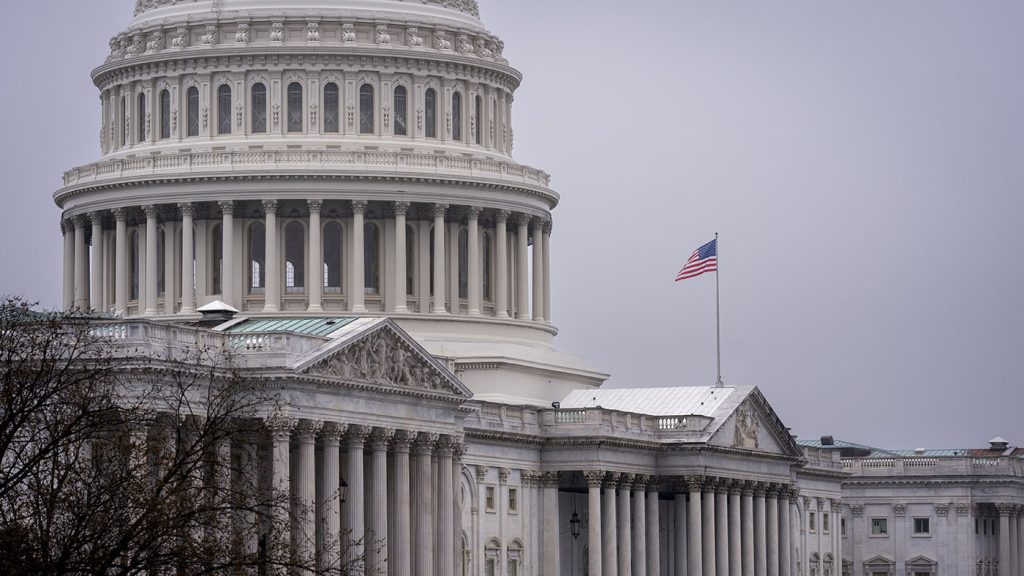On Friday, Senators passed a bill to fund several government agencies for the rest of fiscal year 2024, and sent it to President Biden's desk shortly before the shutdown deadline. Congress has faced challenges in approving full-year spending bills for months.
With a 75-22 vote on Friday evening, the Senate approved a six-bill, $460 billion package, providing full-year funding for various departments such as Veterans Affairs, Agriculture, and Transportation, among others.
The White House expects Biden to sign the bill on Saturday. The Office of Management and Budget stopped preparing for a shutdown on Friday evening after the Senate pushed the legislation forward, and confirmed that agencies will continue normal operations.
The Senate's approval concludes several weeks of difficult bipartisan funding negotiations, which started at the beginning of the year following a months-long deadlock over fiscal 2024 government funding.
This package represents the first of two sets of spending bills Congress is aiming to pass this month. Lawmakers also face a March 22 deadline for the remaining six full-year funding bills, covering areas like Defense, Homeland Security, and Health and Human Services, which are expected to be even more challenging to agree on.
The minibus bill was passed on Friday evening after some last-minute drama in the Senate that threatened to delay the final vote past the midnight funding deadline.
A disagreement over amendments at the last minute slowed down the passage of the legislation, as Republicans sought to force votes on several measures related to contentious issues like the border and earmarks. Any changes to the bill would have required it to be sent back to the House for further consideration, but the lower chamber had already left for the weekend.
The bill eventually overcame a procedural hurdle for later passage on Friday, despite not having the support of Senate Republican Whip John Thune (S.D.) and Sen. John Cornyn (R-Texas). Both senators aimed to block the effort as they sought amendment votes while vying to replace Senate Minority Leader Mitch McConnell (Ky.) as head of the conference.
Leaders eventually agreed to vote on several amendments, but none of them passed.
The measure received bipartisan support in the House with a 339-85 vote on Wednesday. However, reaching an agreement on the bills was a challenging task from the beginning, as both parties had significantly different funding proposals during bipartisan negotiations weeks ago.
Negotiators from both sides have acknowledged the difficulty of allocating funds for programs within the tight constraints of a previous spending caps deal brokered by Biden and former Speaker Kevin McCarthy (R-Calif.) last year.
Sen. Lisa Murkowski (Alaska), the top Republican on the subcommittee responsible for funding the Interior Department, noted the tough budget situation, saying, “It was a really, really, really hard budget. Nobody’s going to like our Interior budget because we had to cut, we had to cut a lot.” said Friday.
Congress had to approve four temporary measures to keep the government funded into fiscal year 2024, which started on Oct. 1. McCarthy was removed as Speaker, partly because he collaborated with Democrats to approve one of those temporary measures.
Even after an agreement on the six-bill minibus was announced, conservatives strongly criticized it, criticizing the overall cost, the exclusion of many of their policy priorities, and the inclusion of billions of dollars in earmarks.
However, GOP leadership has claimed some important victories, including reductions in nondefense funds and increased funding to combat fentanyl.
Democrats have also highlighted victories, such as the exclusion of conservative policy provisions, as well as increased funding in areas like housing and nutrition assistance.
“We’ve fully funded WIC so seven million moms and kids won’t be malnourished. We’ve built on the Infrastructure law by providing billions to repair our roads and bridges and highways,” Senate Majority Leader Chuck Schumer (D-N.Y.) said before the measure’s passage on Friday. “We’ll be able to hire more air traffic controllers and rail safety inspectors. And we’re taking care of our veterans with support for veteran’s homelessness, mental health, and women veterans.”
House GOP negotiators said before the mammoth bill’s introduction last weekend that Democrats gained some leverage in funding talks as spending disagreements in the Republican conference have continued to dominate headlines over the past year.
The package on Friday represents the first full-year funding bills approved by the divided Congress since Republicans regained the House in late 2022.
But not all Democrats are satisfied with the plan.
Some Democrats have expressed frustration with a compromise on a GOP-supported guns-related provision aimed at allowing veterans deemed unable to manage their benefits to purchase guns.
Republicans say the proposal is important to prevent veterans who need help managing their money from losing their gun rights. But Democrats have raised concerns about the impact the measure could have on veterans’ suicide rates, as well as the potential for those deemed “mentally incompetent” to have firearms.
Sen. Chris Murphy (D-Conn.), a spending cardinal, is among the senators who voted against the package on Friday, after describing the provision as a “terrible new gun policy rider that significantly rolls back the firearms background check system.”
Brett Samuels contributed reporting.









